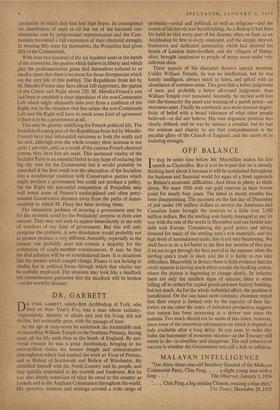DR. GARBETT
DR. CYRIL GARRETT, ninety-first Archbishop of York, who died on New Year's Eve, was a man whose industry, ;nagnanimity, mastery.' of affairs and zest for living did not decline, but noticeably grew, with the passage of time.
At the age of sixty-seven he undertook the formidable task of succeeding William Temple in the Northern Primacy, having spent all his life until then in the South of England. By uni-- versal consent he was a great Archbishop, bringing to his metropolitan duties the human insight and administrative thoroughness which had marked hiS work as Vicar of Portsea, and as Bishop of Southwark and Bishop of Winchester. He identified himself with the North Country and its people, and they quickly responded to his warmth and frankness. But he was also deeply conscious of what he owed to the country as a whole and to the Anglican Communion throughout the world. His speeches, sermons and writings covered a wide range of problems—social and political, as well as religious—and the extent of his travels was breath-taking. As a Bishop it had been his habit to visit every part of his diocese, often on foot; as an Archbishop he flew to every continent, and the simple. shrewd, humorous and dedicated personality which had cheered the hearts of London slum-dwellers, and the villagers of Hamp- shire, brought inspiration to people of many races under very different skies.
Three aspects of his character deserve special mention. Unlike William Temple, he was no intellectual, but he was keenly intelligent, always ready to learn, and gifted with an abundance of common sense. This gave him a better judgement of men, and probably a better all-round judgement. than William Temple ever possessed. Secondly, he carried with him into the hierarchy thf mind and training of a parish priest—an enormous asset. Finally he combined, in a most unusual degree, fixity of belief with a broad tolerance of what other people believed—or did not believe. His own dogmatic position was clearly defined, and he was by instinct a ritualist, but he had the wisdom and charity to see that comprehension is the peculiar glory of the Church of England, and the secret of its enduring strength.


































 Previous page
Previous page